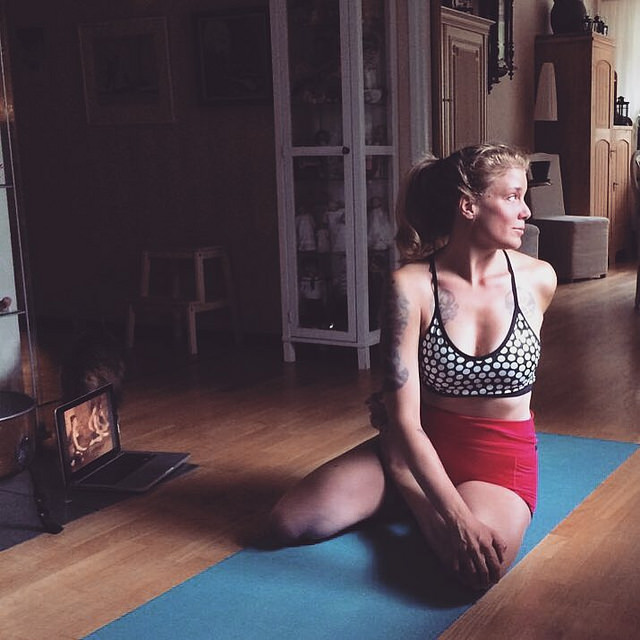I recently had an encounter with a young university student at my local gym that sparked my interest in the apparent divide between Christians and the practice of yoga and meditation.
 She approached me after witnessing some of my “gymnastics” exercises in the warm-down area, wanting to know more.
She approached me after witnessing some of my “gymnastics” exercises in the warm-down area, wanting to know more.
However, when I told her I was actually doing yoga, her face dropped.
“Oh, I’ve always wanted to do yoga,” she said. “But I can’t. I’m a Christian.”
Huh? I was a bit shocked and confused at this statement. But most of all intrigued—what on Earth would prevent a young girl, Christian faith or otherwise, to feel that she has no opportunity to explore the many wonderful benefits that yoga might offer her?
The more we spoke the more I learned—apparently the spiritual connection that yoga encourages in some ways conflicts with the spiritual path of followers of Jesus Christ. Postures that imitate ancient Hindu Gods or prayer positions are also thought to be disrespectful to their Christian faith.
My initial reaction was to reassure this girl that, in my understanding, yoga was not betrothed to any particular religion or faith, but that it was a journey within oneself where one never really stopped learning and growing. I argued that the practice of yoga could even potentially enhance her connection with Jesus Christ as she learnt more about herself and connected her mind with her body and spiritual beliefs. But I didn’t really have any credible evidence to support this argument (aside from an intuitive inclination!).
Surely a practice that encourages self-awareness, improves health, flexibility and fitness, and soothes and nourishes our active minds, could not be of any disservice to any human being, let alone one of Christian faith?
I decided to delve deeper into this mysterious hypothesis.
And what I found seriously surprised me.
Yoga is “dangerous” and “impersonal?”
The first paper I came across was written by Michael Gleghorn, an historian, theologist and research associate with Probe Ministries in the U.S. A devout Christian, he offers a string of arguments against the compatibility of yoga and Christianity. Based on his research he reports that “..unlike yoga, Christianity views salvation as a ‘free gift’ that can only be received, not earned.”
This is an interesting perspective. Are we as yogis seeking salvation? Do we feel that we are “earning” our way toward an ultimate end point?
Gleghorn concludes that the seemingly “innocent” physical practice of yoga in Western society is in fact an “..ancient spiritual discipline deeply rooted in the religion of Hinduism” and that “..Christians seeking physical exercise would be wise to consider techniques other than yoga.” Some of these suggested “techniques” include low-impact or water aerobics, water ballet, or simple stretching. I’m not sure what the fascination with water is, but it seems to fall a little short of the mark. References to the “impersonal” and “dangerous” connection of the self through yoga tend to further reinforce this.
Yoga as a form of “Witchcraft?!”
Laurette Willis, Founder of PraiseMoves Fitness Ministry, echoes Gleghorn’s sentiments. Willis speaks of the “dangers of yoga,” citing “mind-numbing tranquillity” and the “twisted plan of salvation through yoga” as potential threats to the connection with Jesus Christ. She also holds similar views on the influence of Tai Chi and traditional martial arts. Furthermore, she specifically warns against the practice of pranayama in yoga due to its effects of “manipulating life force energy,” and cautions that those who engage in this practice are moving into the realms of psychism, magic and witchcraft.
Why such a fear of yoga? Shouldn’t those most dedicated to Christian values be loyal and trusting in their own beliefs and values, but similarly encouraged to try new things in life and embrace their own inner spirit?
The Christian Yogis:
I was relieved to learn that not all people of faith regard yoga in such a dangerous light. The Christians Practicing Yoga community is a network of Christians from a variety of faiths “practicing yoga to go to God the way God came to us, in and through the body.” They claim to be drawn together through their own individual experiences and believe that yoga and meditation in fact deepen and enrich their Christian faith. The sheer existence of this network seems evidence enough to support the theory that not all Christians adhere to the denunciation of yoga as a physical and/or spiritual pursuit.
Yogi and Christian Russill Paul believes that neither Yoga nor Christian tradition is necessarily “better” than the other—only unique. In his opinion, “A practicing yogi could very well make Jesus the centre of his or her attention, and use the methodology and the teaching. We (also) see that Jesus himself propagates a kind of yoga, a yoga of love.” This seemed to support my original “pre-investigation” assumptions.
Roni Sloman, devout Christian and founder of Bella Prana Yoga claims that yoga helped her to fall in love with herself and strengthen her connection to God. Her yoga studio attempts to provide a safe and warm environment to “expand physically and spiritually no matter your religion or stage of life.” She further explains that yoga offers a set of structured guidelines that can be incorporated (or not) into any given faith. In her everyday practice, Sloman chooses to dedicate the flowing movements of sun salutations to Christ, challenging her body, observing her breath and seeking to become more whole with “..this temple that God has given me…I walk away a more devoted Christian, and can’t wait to do it again tomorrow.”
Vyn Bailey is another Christian yogi who is in favour of the compatibilities between yoga and religion. In his translation of Patanjali’s Yoga Sutras (Patanjali’s Meditation Yoga) he states that “Patanjali is for all” (implying that yoga is for all), whether one is of Christian, Jewish, Hindu, Buddhist or Muslim faith (1997, p7). Bailey himself was ordained as a priest in Rome in the late 1930s and graduated from the prestigious Gregorian University with a degree in theology. He spent 17 years teaching in seminaries and colleges and offers the belief that genuine yoga, as originally practised, poses no threat to Christian beliefs or religious upbringing (p5). In his opinion, the meditation technique he teaches comes direct from the ancient tradition of Patanjali, and it is the subject matter (or that which is meditated upon) that comes from one’s own tradition or religion.
Insight from the great B.K.S Iyengar:
The final (and perhaps most valuable) point of reference and wisdom on the subject comes from the words of the late B.K.S Iyengar when he reminds us of the true nature of yoga, as one, with man at the centre. He offers a view on the subject of religion and yoga in his highly respected text The Tree of Yoga , explaining that yoga is so much more than a simple physical exercise, “..it is cellular, mental, intellectual and spiritual—it involves man in his entire being.”
Iyengar distinguishes yoga practice from all other physical exercise, highlighting the integral role that man himself, in a very personal way, sits at the very centre of this path which “..cultures the body, civilises the intelligence and takes rest in the soul” (1988, p1). He remarks that there are many different words by which individuals express their approach to yoga and the paths through which they reach the culmination of their art, “..but yoga is one, just as God is one though in different countries people call Him by different names” (1988, p3).
It is perhaps his statement below that I will share with my newfound Christian acquaintance, and encourage her to think about yoga not in terms of any religious incongruencies, but as a practice that can be further explored and shaped to enhance her existing spiritual connections, with the possibility of bringing her closer to Jesus Christ:
“..we are all human beings created by God with no differences between us at all. We are all one. The methods of spiritual development are given for the evolution of individuals throughout the world…do not get carried away by the words which are used in different countries. The essence is the same” (p3).
Namaste, Mr. Iyengar!
“The Kingdom of God is within you.” (Luke 17:21)
Sources:
Bailey, V. 1997 Patanjali’s Meditation Yoga, Simon & Schuster Australia, East Roseville.
Iyengar, B.K.S. 1988 The Tree of Yoga: The definitive guide to yoga in everyday life, HarperThorsons, London.
Author: Tehla Bower
Image: Helen Alfvegren/Flickr
Editor: Emily Bartran


 Share on bsky
Share on bsky






Read 0 comments and reply